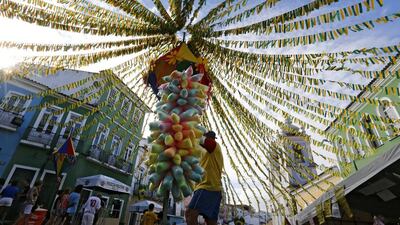It is fitting that Salvador, one of the most important cities in the Islamic history of Brazil, should host the World Cup’s first match in 20 years between two countries with substantial Muslim populations.
On Thursday, only a few kilometres from where an Islamic slave revolt occurred 179 years ago, Iran will take on Bosnia-Herzegovina.
Iran are looking to secure a place in the second round for the first time in their history. Should they succeed, Nigeria will be eliminated.
Click here to visit The National’s World Cup 2014 landing page
It is a fact that resonates with Sheikh Abdulhamid Ahmed, the spiritual leader of Islam in the Brazilian state of Bahia. He was born in Osun, west Nigeria.
“In 1992, I was invited from Nigeria to be the sheikh here,” he told The National by phone from his office at Salvador’s Islamic Culture Centre. “Many of the slaves that arrived all those years ago came from Lagos, so we have a heritage. I did not know the history of Bahia before I arrived, but I quickly learnt about it. It is fascinating.”
In Slave Rebellion in Brazil: The Muslim Uprising of 1835, historian Joao Jose Reis details that more than a third of the slaves that revolted were from cities now recognised as either in Benin or Nigeria. The predominant faith among African slaves was Islam and, while resisting the imposition of Catholicism, they proceeded to buy their freedom and plan a rebellion.
To maintain secrecy, they detailed their plans in written Arabic and some historians believe the slaves intended to turn Bahia into an Islamic republic.
Read more: From Yaya Toure to Karim Benzema, footballers balance Ramadan and World Cup
However, when the revolt began, in January 1835, four leaders were sentenced to death, dozens of others killed in combat and several arrested and held at Salvador’s now-famous fort. Ultimately, the Muslim uprising was quelled and, with Islamism restrained, the history was forgotten.
“It was only in 1991, when a historian from Sao Paulo came here and rediscovered some things, that the Islamic culture was resurrected,” Sheikh Abdulhamid said. “A small place was rented for Muslim students to come and meet and that, in time, became the Islamic Culture Centre.”
At the time of the revolt, Salvador was home to more than 20 mosques; it now has only one. Yet the signs of Salvador’s Islamic past are still evident. Many residents – men and women – wear white clothing, said to be a legacy of the Muslim slaves, while one of the city’s most popular relaxation spots is called Jardim de Ala (Garden of Allah).
“Probably, this is where slaves came to meet and pray, especially the freed slaves,” Sheikh Abdulhamid said. “If you go to the church there, the building is designed in Arabic architecture. Some of the writing inside the church is even in Arabic, suggesting maybe it was once a mosque, although there is no proof.”
Last week, he said, between 10 and 15 foreign football fans turned up at the Islamic Culture Centre for the Friday prayer sermon. More are expected this week because the Holy Month of Ramadan starts on Sunday and because today is match day.
At the Arena Fonte Nova this afternoon, for the first time since Saudi Arabia defeated Morocco at the 1994 World Cup, two countries with significant Muslim populations will face off in Fifa’s showpiece event.
The likes of Bosnia’s Edin Dzeko and Miralem Pjanic will come up against Iran’s Javad Nekounam and Andranik Teymourian.
No special plans are in place to welcome either players or fans, but if they should explore the cobbled streets of the city’s beautiful Pelourinho district – a colourful, history-rich neighbourhood – they will see large women with obvious African roots dressed in white and selling their wares, well-balanced Brazilian men practising capoeira, and the Federation of Muslim Associations in Brazil (Fambras) distributing books and pamphlets.
“Salvador is a very special city in the history of Islam in Brazil,” said Ali Hussein El Zoghbi, the Brazil-born vice president of Fambras. “With Bosnia and Iran playing there – and Nigeria also being in the same group – we are assured a Muslim team will progress to the knockout stages, which is great.”
If Iran should beat Bosnia 1-0 in Salvador and Argentina defeat Nigeria 1-0 in Porto Alegre, such will be the equal standings that lots will be drawn to see which of Iran and Nigeria will qualify to the last 16. Which, it could be said, is almost as antiquated a way of deciding the two teams’ fates as the Islamic history of Salvador.
gmeenaghan@thenational.ae
Follow our sports coverage on twitter at @SprtNationalUAE

